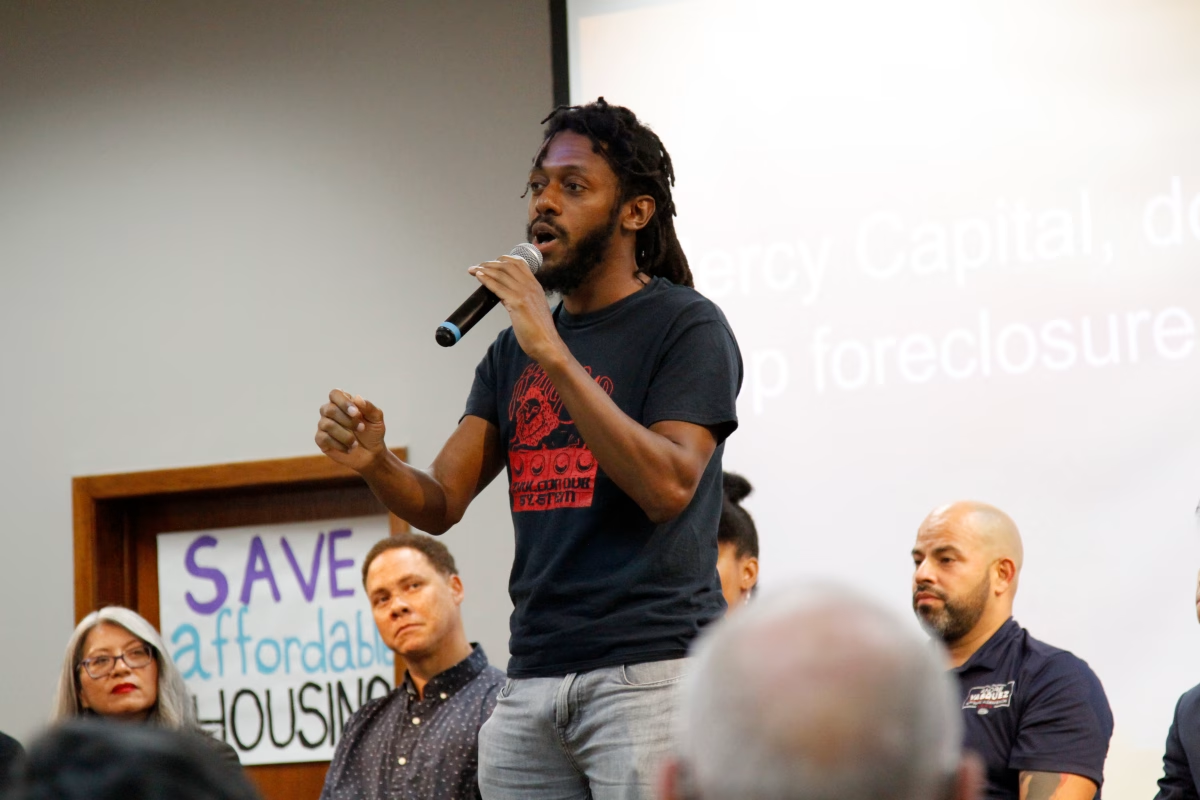Chicagoans who once found solace in affordable housing face instability as property companies threaten to shut down multiple low-income apartment buildings on the North Side.
Prompted by the planned closure of affordable housing in the Uptown and Rogers Park neighborhoods, nonprofit organization ONE Northside hosted a town hall on Sept. 29. ONE Northside members, local government officials and other community members gathered to support affordable housing, community safety and green public schools.
“People united will never be defeated,” attendees chanted. Handmade signs and t-shirts saying “The rent is too damn high” echoed the sentiments of the 14 speakers called to the stage by ONE Northside. They called for preserving single-room occupancy housing, also known as SROs, and for property companies to stop evicting low-income tenants.
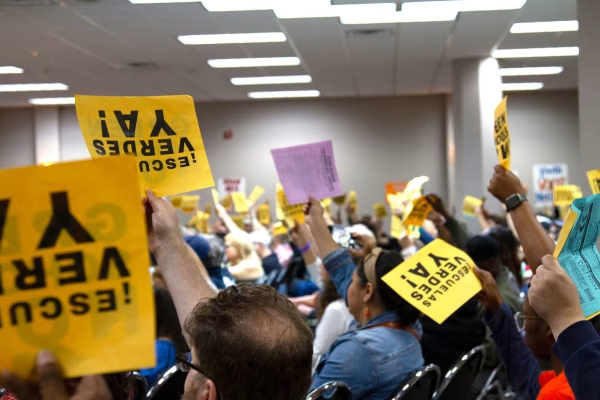
ONE Northside primarily focused on two buildings when discussing affordable housing: the Leland Hotel at 1201 W. Leland Ave. and San Miguel Apartments at 907 W. Argyle St. Welfare institution Heartland Housing owns these buildings but they have gone into foreclosure after Heartland Housing filed for bankruptcy last year.
Jeff Martin, a tenant at the Leland Hotel, said he moved there after becoming disabled from a stroke. Martin said he could not afford rent due to his disability and received an eviction notice filed from his previous landlord. He credited the Leland Hotel with saving him from living in a nursing home. Since then, the building has gone into foreclosure, risking the displacement of 137 tenants, according to the ONE Northside website.
Anthony Perkins, leader of ONE Northside’s Housing Justice Committee, said he has experienced the consequences of inaccessible affordable housing firsthand and through working with other struggling tenants.
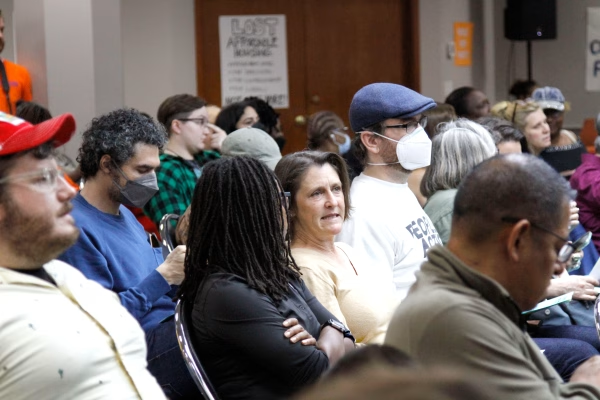
“The removal of affordable housing is getting more people on the street,” Perkins said. “It’s getting more people living in tents, sleeping on trains, and sleeping wherever they can.”
The loss of affordable housing remains a widespread issue, although it has disproportionately impacted Chicago neighborhoods like Uptown, Edgewater and Rogers Park, according to Angela Clay, the alderwoman for Chicago’s 46th Ward, which includes Uptown.
A 2023 study from DePaul’s Institute of Housing Studies states that Uptown and Rogers Park saw a 12.5% decline in affordable apartments available for low-income renters between 2012 and 2021. Only the Logan Square/Avondale and West Town/Near West Side categories saw bigger drops with 15.3% and 14.6% respectively.
“It’s coming to parts of the city that have historically been hubs for diversity,” Ald. Clay, a lifelong Uptown resident who grew up living in affordable housing, said. “In Uptown we’ve had a melting pot that is becoming less full because people cannot afford to be in this beautiful community.”
The Leland Hotel and San Miguel Apartments fall under Clay’s jurisdiction. She said that removing other affordable housing has already negatively impacted the neighborhood, decreasing access to resources that the community relies on.
“It’s tearing at the fabric of our community because it places people against each other based on their interests,” Clay said.
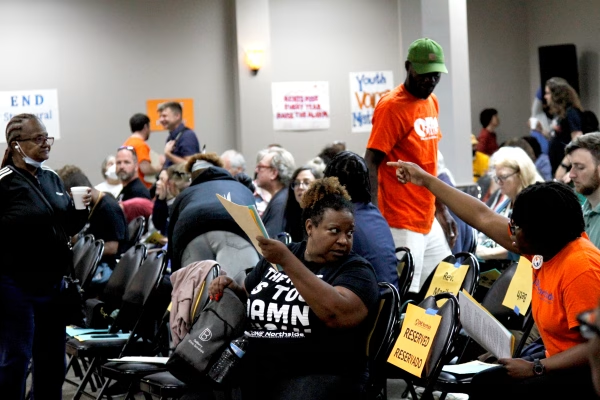
Clay said that nonprofit agencies that once stationed themselves in Uptown have moved, forcing residents to travel further to receive medical services, mental health support and public libraries. Schools also have seen lower levels of enrollment.
People have struggled to preserve affordable housing in neighborhoods like Uptown for varying reasons. According to Clay, there’s a lack of funding for affordable housing providers to maintain their buildings.
“We don’t have a pot of money for affordable housing providers who have been in our communities for decades to pull from to upgrade the building, to make sure that they’re providing long-term subsidies,” Clay said. “We leave them on their own to care for vulnerable people who have limited resources.”
Beth Rochford, a member of ONE Northside’s police accountability team focusing on community safety who spoke at the meeting, said that gentrification also increases the risk of losing affordable housing.
“As Uptown gentrifies, they are building luxury places and getting rid of reasonably priced SROs,” Rochford said.
The increasing closures of affordable housing have motivated local government officials and low-income renters to act against foreclosures.
“I see a bright future for affordable housing,” Perkins said. “We have our alderpeople saying that they’ll step up and get all of this paid.”
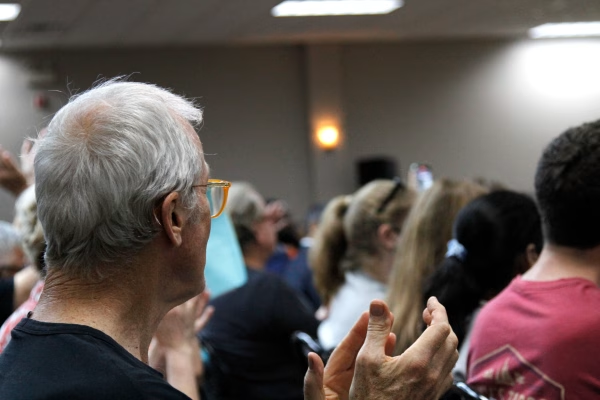
The five alderpeople, the Department of Housing Commissioner, the state representative and the state senator in attendance at the meeting agreed to prioritize preserving affordable housing in their jurisdictions. They plan to help by funding foreclosed affordable housing buildings that Heartland Housing can no longer afford. The officials in attendance also promised to standby those protesting the eviction of affordable housing tenants.
Despite the impending closure of affordable housing buildings, the town hall attendees have hope for their future.
“Where I live, they have a new ordinance that protects affordable housing,” Rochford said. “It’d be great if they could get something similar in this area too. If the people affected by rent increases work together, I think that we can have reasonably priced housing in this area.”
Related Stories
- As Chicago closes migrant shelters, community leaders step up to help those already here
- Affordable housing activists advocate for rent control
- Find your fit: Insider tips for Chicago’s competitive spring rental season
Support Student Journalism!
The DePaulia is DePaul University’s award-winning, editorially independent student newspaper. Since 1923, student journalists have produced high-quality, on-the-ground reporting that informs our campus and city.
We rely on reader support to keep doing what we do. Donations are tax deductible through DePaul's giving page.


